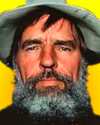 (source)
(source)
|
Edward Abbey
(29 Jan 1927 - 14 Mar 1989)
American author whose writings about the environment and public land policies were sometimes cynical, mischievous, unorthodox and witty. His best-known book is probably Desert Solitaire (1968) was based on extensive known of the southwestern U.S.
|
Science Quotes by Edward Abbey (20 quotes)
A good philosopher is one who does not take ideas seriously.
— Edward Abbey
In 'Philosophy, Religion, and So Forth', A Voice Crying in the Wilderness (1989), 1.
Better a cruel truth than a comfortable delusion.
— Edward Abbey
In 'Philosophy, Religion, and So Forth', A Voice Crying in the Wilderness (1989), 12.
From the point of view of a tapeworm, man was created by God to serve the appetite of the tapeworm.
— Edward Abbey
In 'Philosophy, Religion, and So Forth', A Voice Crying in the Wilderness (1989), 4.
Growth for the sake of growth is the ideology of the cancer cell.
— Edward Abbey
In 'Arizona: How Big is Enough?', One Life at a Time, Please (1988), 21.
High technology has done us one great service: It has retaught us the delight of performing simple and primordial tasks—chopping wood, building a fire, drawing water from a spring.
— Edward Abbey
In 'Science and Technology', A Voice Crying in the Wilderness (Vox Clamantis in Deserto) (1989), 91.
Is there a God? Who knows? Is there an angry unicorn on the dark side of the moon?
— Edward Abbey
In 'Philosophy, Religion, and So Forth', A Voice Crying in the Wilderness (1989), 2.
Nowhere is water so beautiful as in the desert for nowhere else is it so scarce. By definition. Water, like a human being or a tree or a bird or a song gains value by rarity, singularity, isolation. In a humid climate water is common. In the desert each drop is precious.
— Edward Abbey
Essay in Desert Images, collected in Beyond the Wall: Essays from the Outside (1984), 82.
Only a fool would leave the enjoyment of rainbows to the opticians. Or give the science of optics the last word on the matter.
— Edward Abbey
In 'Philosophy, Religion, and So Forth', A Voice Crying in the Wilderness (1989), 12.
Quantum mechanics provides us with an approximate, plausible, conjectural explanation of what actually is, or was, or may be taking place inside a cyclotron during a dark night in February.
— Edward Abbey
In 'Science and Technology', A Voice Crying in the Wilderness (Vox Clamantis in Deserto) (1989), 91.
Reason has seldom failed us because it has seldom been tried.
— Edward Abbey
In 'Philosophy, Religion, and So Forth', A Voice Crying in the Wilderness (1989), 2.
That which today calls itself science gives us more and more information, an indigestible glut of information, and less and less understanding.
— Edward Abbey
In 'Down the River with Henry Thoreau,' collected in Stephen Trimble (ed.), Words from the Land: Encounters with Natural History Writing (1981, 1988), 62.
The canyon country does not always inspire love. To many it appears barren, hostile, repellent—a fearsome, mostly waterless land of rock and heat, sand dunes and quicksand. cactus, thornbush, scorpion, rattlesnake, and agoraphobic distances. To those who see our land in that manner, the best reply is, yes, you are right, it is a dangerous and terrible place. Enter at your own risk. Carry water. Avoid the noon-day sun. Try to ignore the vultures. Pray frequently.
— Edward Abbey
The Journey Home
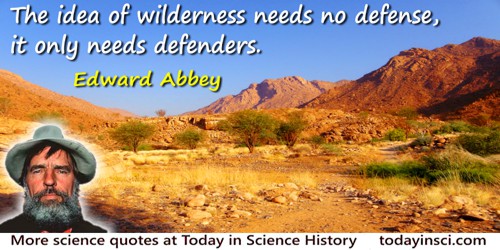
https://www.publicdomainpictures.net/en/view-image.php?image=46191&picture=rocky-desert-landscape (source)
The idea of wilderness needs no defense, it only needs defenders.
— Edward Abbey
In 'Shadows from the Big Woods', The Journey Home: Some Words in Defense of the American West (1977), 229.
This is the most beautiful place on Earth. There are many such places. Every man, every woman, carries in heart and mind the image of the ideal place, the right place, the one true home, known or unknown, actual or visionary.
— Edward Abbey
Opening sentences in 'The First morning', Desert Solitaire (1968,1988), 1.
We must learn to think not only logically, but bio-logically.
— Edward Abbey
In One Life at a Time, Please (1988), 68.
What is the purpose of the giant sequoia tree? The purpose of the giant sequoia tree is to provide shade for the tiny titmouse.
— Edward Abbey
In 'Philosophy, Religion, and So Forth', A Voice Crying in the Wilderness (1989), 12.
Where, precisely, is the location of—a rainbow? In the air? In the eye? In between? Or
somewhere else?
— Edward Abbey
In 'Philosophy, Religion, and So Forth', A Voice Crying in the Wilderness (1989), 11.
Who needs astrology? The wise man gets by on fortune cookies.
— Edward Abbey
In 'Philosophy, Religion, and So Forth', A Voice Crying in the Wilderness (1989), 3.
Why administrators are respected and school-teachers are not: An administrator is paid a lot for doing very little, while a teacher is paid very little for doing a lot.
— Edward Abbey
In 'Money Et Cetera', A Voice Crying in the Wilderness (Vox Clamantis in Deserto) (1989), 101.
With the neutron bomb, which destroys life but not property, capitalism has found the weapon of its dreams.
— Edward Abbey
In 'Money Et Cetera', A Voice Crying in the Wilderness (Vox Clamantis in Deserto) (1989), 100.
See also:
- Desert Solitaire, by Edward Abbey. - book suggestion.

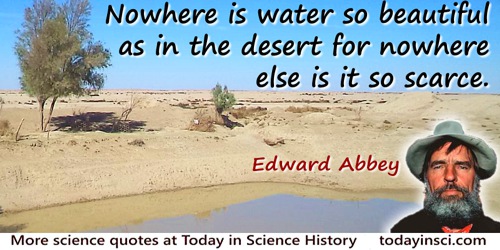
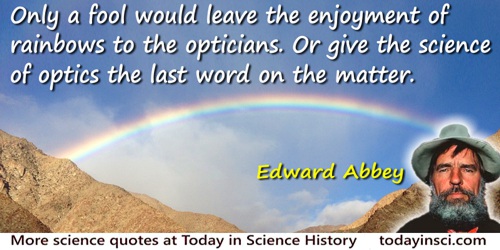
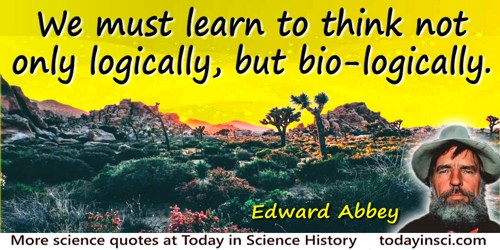
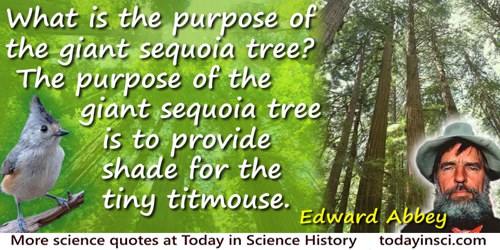
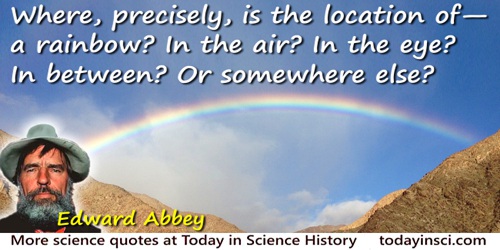
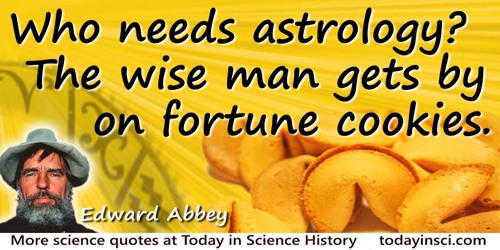

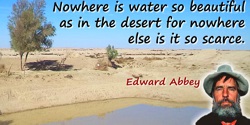
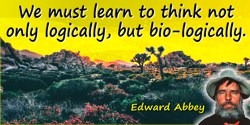
 In science it often happens that scientists say, 'You know that's a really good argument; my position is mistaken,' and then they would actually change their minds and you never hear that old view from them again. They really do it. It doesn't happen as often as it should, because scientists are human and change is sometimes painful. But it happens every day. I cannot recall the last time something like that happened in politics or religion.
(1987) --
In science it often happens that scientists say, 'You know that's a really good argument; my position is mistaken,' and then they would actually change their minds and you never hear that old view from them again. They really do it. It doesn't happen as often as it should, because scientists are human and change is sometimes painful. But it happens every day. I cannot recall the last time something like that happened in politics or religion.
(1987) -- 


